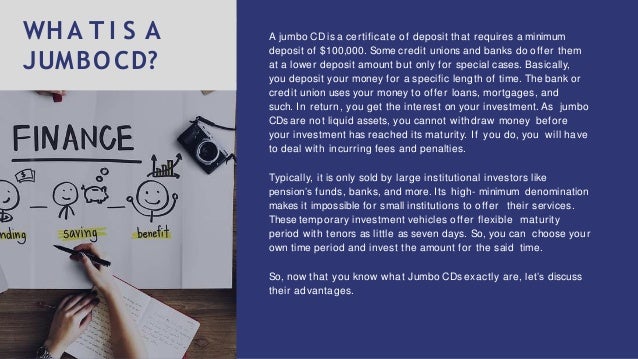Please turn on JavaScript in your browser
- A jumbo CD refers to the large account opening balance required for these types of CDs. Usually, a jumbo CD has a minimum account opening balance of $100,000, but that isn’t always the minimum.
- Our Jumbo CDs pay the highest rate of interest with a minimum deposit of $100,000, while still providing you flexibility. A minimum deposit of $100,000. Typically earns higher interest than traditional CDs with equivalent terms.
- Some jumbo CDs are also offered on a short-term basis, allowing customers with big sums of idle money to earn interest over periods of time as short as a week or a month. Like any CD, the main drawback of a jumbo CD is the fact that your money is untouchable unless you’re willing to incur a large fee. While those who typically open a jumbo CD.
It appears your web browser is not using JavaScript. Without it, some pages won't work properly. Please adjust the settings in your browser to make sure JavaScript is turned on.
A jumbo CD is a special CD that generally requires a large minimum deposit. There isn’t a set standard for how large a deposit you need to make to open a jumbo CD. It varies by bank or credit union and commonly ranges from $50,000 to $100,000 or more. I saw 'Jumbo' when I was in college, back in the 60's. I loved musicals; I loved 'Jumbo.' I have always enjoyed the music of Doris Day, especially that she recorded in the 60's. Her voice, her music, holds up well all of these years later. As someone put across in a recent bio, she may be the best of the girl singers.
Open a Chase Certificate of Deposit
You must be an existing Chase checking customer to open online.
Certificate of Deposit FAQ
What is a Chase CD?
 expand
expandA certificate of deposit, or CD, is a deposit account with us for a specified period of time.
What is the minimum deposit amount to open a Chase CD?
$1,000
How is the Chase CD interest calculated?
Jumbo Cd Rates 3% Or Better
We use the daily balance method to calculate interest on your CD. This method applies a periodic rate each day to your balance. Interest begins to accrue on the business day of your deposit. Interest for CDs is calculated on a 365-day basis, although some business CDs may calculate interest on a 360-day basis. The Annual Percentage Yield (APY) disclosed on your deposit receipt or on the maturity notice assumes interest will remain on deposit until maturity. On maturities of more than one year, interest will be paid at least annually. Please see the Deposit Account Agreement and rate sheet for further details.
Are there early withdrawal fees or penalties associated with a Chase CD?
There is a penalty for withdrawing principal prior to the maturity date. For Personal CDs:
- If the term of the CD is less than 6 months, the early withdrawal penalty is 90 days of interest on the amount withdrawn, but not more than the total amount of interest earned during the current term of the CD.
- If the term of the CD is 6 months to less than 24 months, then the early withdrawal penalty is 180 days of interest on the amount withdrawn, but not more than the total amount of interest earned during the current term of the CD.
- For terms 24 months or more, the early withdrawal penalty is 365 days of interest on the amount withdrawn, but not more than the total amount of interest earned during the current term of the CD.
- If the withdrawal occurs less than seven days after opening the CD or making another withdrawal of principal, the early withdrawal penalty will be calculated as described above, but it cannot be less than seven days’ interest.
- The amount of your penalty will be deducted from principal.
See the Deposit Account Agreement and rate sheet for further details
What does it mean when my Chase CD matures?
The maturity date is the last day of your CD’s term. The grace period begins the following day and lasts for 10 days – this is when you can make changes to your CD. Go to chase.com/cdmaturity to learn more about what options you have when your CD matures.
Find a Chase ATM or branch
To find a Chase ATM or branch near you, tell us a ZIP code or an address.
Open a Chase Certificate of Deposit
You must be an existing Chase checking customer to open online.
Certificate of Deposit FAQ
What is a Chase CD?
A certificate of deposit, or CD, is a deposit account with us for a specified period of time.
What is the minimum deposit amount to open a Chase CD?
$1,000
How is the Chase CD interest calculated?
We use the daily balance method to calculate interest on your CD. This method applies a periodic rate each day to your balance. Interest begins to accrue on the business day of your deposit. Interest for CDs is calculated on a 365-day basis, although some business CDs may calculate interest on a 360-day basis. The Annual Percentage Yield (APY) disclosed on your deposit receipt or on the maturity notice assumes interest will remain on deposit until maturity. On maturities of more than one year, interest will be paid at least annually. Please see the Deposit Account Agreement and rate sheet for further details.
Are there early withdrawal fees or penalties associated with a Chase CD?
There is a penalty for withdrawing principal prior to the maturity date. For Personal CDs:
- If the term of the CD is less than 6 months, the early withdrawal penalty is 90 days of interest on the amount withdrawn, but not more than the total amount of interest earned during the current term of the CD.
- If the term of the CD is 6 months to less than 24 months, then the early withdrawal penalty is 180 days of interest on the amount withdrawn, but not more than the total amount of interest earned during the current term of the CD.
- For terms 24 months or more, the early withdrawal penalty is 365 days of interest on the amount withdrawn, but not more than the total amount of interest earned during the current term of the CD.
- If the withdrawal occurs less than seven days after opening the CD or making another withdrawal of principal, the early withdrawal penalty will be calculated as described above, but it cannot be less than seven days’ interest.
- The amount of your penalty will be deducted from principal.
See the Deposit Account Agreement and rate sheet for further details
Jumbo Cd Rates 1 Year
What does it mean when my Chase CD matures?
The maturity date is the last day of your CD’s term. The grace period begins the following day and lasts for 10 days – this is when you can make changes to your CD. Go to chase.com/cdmaturity to learn more about what options you have when your CD matures.
Find a Chase ATM or branch
To find a Chase ATM or branch near you, tell us a ZIP code or an address.
Jumbo CD Rates
Jumbo CDs allow customers with large sums of money to make a tidy return on a low-risk investment.
Like a regular CD, jumbo CDs require locking up some of your cash for a predetermined period of time, in exchange for some of the highest interest rates in the financial industry. Plus, jumbo CDs are usually negotiable, meaning you can sell them to someone else. They typically – but not always – come with a minimum deposit of at least $100,000 and your funds are locked up for a predetermined period of time, usually between six months and five years.
Advertiser DisclosureBest jumbo CDs of July 2020
CIT Bank – Max APY 1.05%, min. deposit: $100,000


CIT Bank is an online bank that offers competitive CD rates or shorter terms. It also has no fees for opening your jumbo CD account. Jumbo CDs from CIT Bank vary from six months to five years with a minimum deposit of $100,000 and a maximum 1.75% APY, which is better than many other national banks’ APYs.
Golden 1 Credit Union –Max APY 1.60%, min. deposit: $100,000
Golden 1 Credit Union has been around since 1933 with open membership to all Californians. It has more than 72 branches in California and has a minimum deposit of $100,000 for jumbo CDs and a maximum APY of 2.00%, which is higher than many credit unions around the country. If you live outside California, you can still join if you’re a family member of an existing Golden 1 member or a member of a select employee group.
Merrick Bank – Max APY 0.85%, min. deposit: $25,000
Merrick Bank has a low minimum deposit on its CDs of only $25,000, but a high APY of 1.87%. Merrick also has six-month, 12-month, 18-month and 24-month terms, 24/7 account access, no hidden fees and all CDs are FDIC-insured up to the maximum allowed by law.
USAA – Max APY 0.66%, min. deposit: $95,000
USAA offers standard, jumbo and super jumbo CDs for military members and their families. Jumbo CD rates vary from 0.08% for 30 days up to 1.11% for a five year term. The minimum deposit is $95,000 up to a maximum of $174,999. Besides great jumbo CD rates and terms, USAA offers tools and advice on a variety of financial products.
First Horizon – Max APY 0.25%, min. deposit: $100,000
Unlike most other providers, First Horizon offers jumbo CDs only to small and commercial businesses for owners to make a low-risk return on investments for terms from seven days to one year. Its jumbo CDs have a maximum APY of 1.60% and a minimum deposit of $100,000. Interest is credited at maturity, so one-year CD customers won’t see their earnings until the end of the term.

Compare the best jumbo CDs of 2020
Jumbo CDs vs regular CDs
If you’re trying to make a decision between a jumbo CD vs. a regular CD, you’ll have to take a look at how much money you want to invest. While both of these products tend to have similar loan terms, the minimum deposit on a jumbo CD is often much higher–but not always. Most regular CDs only require a deposit amount of between $500 and $1,000, or sometimes no minimum deposit requirement at all, while jumbo CDs can start as high as $100,000.
Jumbo CDs vs high-yield savings accounts
As the name suggests, high-yield savings accounts offer higher interest rates than traditional savings accounts. Still, the rates they offer are not usually as high as what you might find with a CD, particularly jumbo or super jumbo CDs. However, high-yield savings accounts are much more flexible than CDs. While it’s true you can only make six withdrawals per month with a savings account, you can make withdrawals whenever you want. However, with a CD, you must wait for the term to expire or face early withdrawal penalties. It’s best to invest in a jumbo CD when you’re 100% sure you won’t need to touch your cash for the entire term.
Jumbo CDs vs money market accounts
Money market accounts are similar to savings accounts. While there are limits on the amount of withdrawals you can make per month (six), as long as you stay within those limits there are no penalties for accessing your money like with CDs that charge early withdrawal penalties. Plus, some money market accounts come with the ability to write checks or access your money via a debit card. A jumbo CD comes with none of these benefits, but will often provide a higher interest rate in exchange for locking up your cash for a set period of time.
Pros and cons of jumbo CDs
Pros:
- High interest rates
- Low-risk for high investment
- Can be used as collateral
Jumbo Cd Term

Jumbo Cd 2020
Cons
- High minimum deposit
- Low liquidity for large investment
- Not good for CD laddering
Are jumbo CDs meant to be short-term?
While jumbo CDs offer flexible terms, most are not meant to be short-term. Although some providers offer high APYs on shorter terms, most jumbo CDs have better rates for longer terms. And, while savings accounts are best if you want to put your money away for shorter periods of time, a CD can help you save for a purchase or expense a few years down the road. Some providers, like CIT Bank don’t offer CDs for terms less than one year, while others like First Horizon offer a seven-day CD term.
Jumbo CD penalties
CDs require you to leave your money in the account for a certain length of time. If you withdraw your money from your CD prior to the end of the term, you will likely face an early withdrawal penalty.
Sometimes banks will have different penalties on different term lengths, and some will charge a minimum penalty no matter when you access your funds. Some examples of early withdrawal penalties include:
This is just an example and is not reflective of all withdrawal penalties by all CD providers.
The final word
Jumbo Cd Rates Wells Fargo
Before you put your money into a CD, make sure you know the pros and cons and you are clear about your long-term objectives. Jumbo CDs offer a better return on your money than most savings accounts, but they are meant to be long-term investments. If you pull out your money before the end of the predetermined term, you’ll face early withdrawal penalties. But, if you have a large sum of money and you’re not certain you want to invest in stocks or other insecure investment, the fixed APY on jumbo CDs may be what you’re looking for.